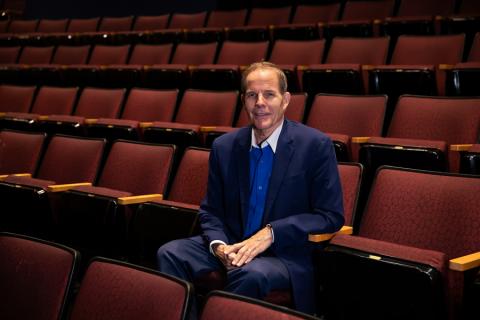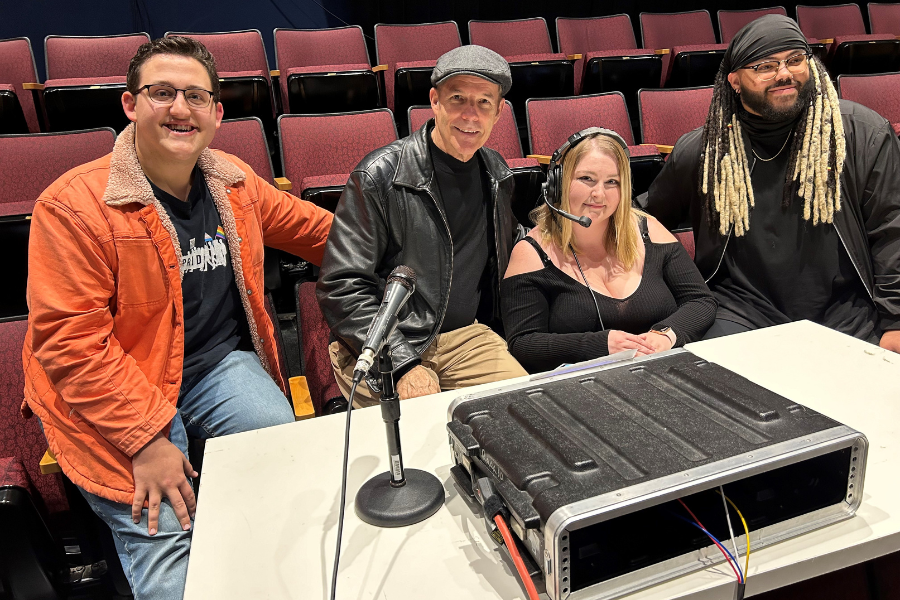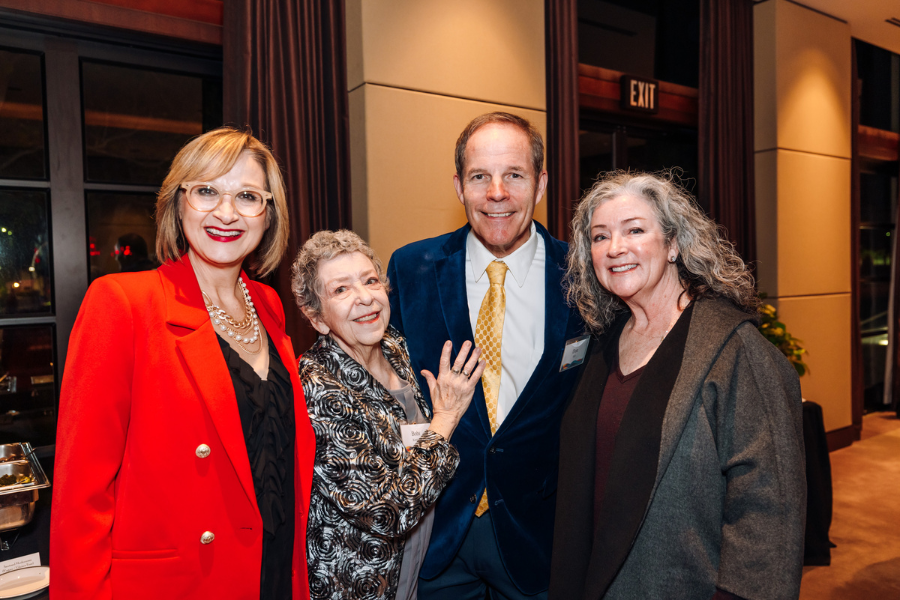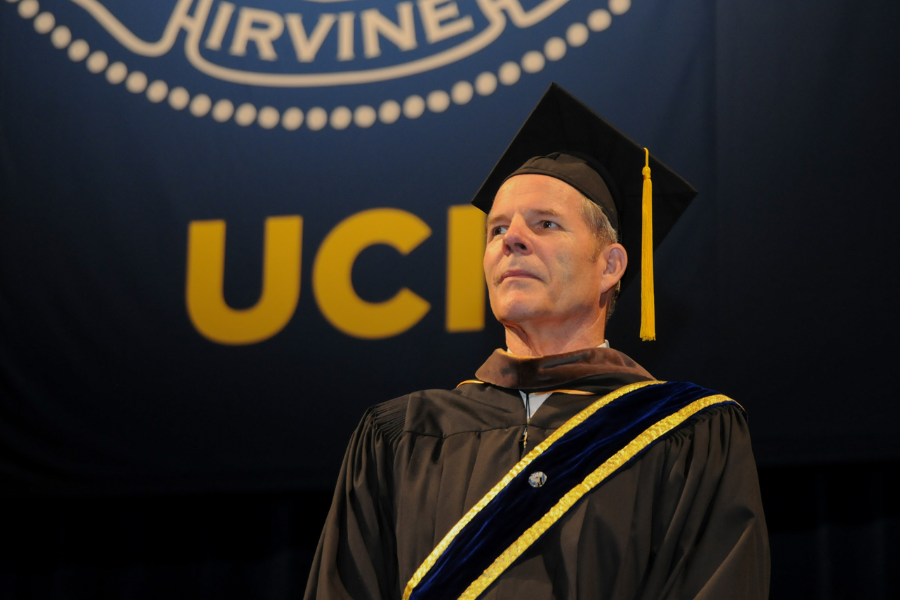That’s Show Biz
Don Hill makes his final curtain call after 20 years with CTSA
By Christine Byrd
Theater is a risky business. No one knows that better than veteran stage manager and producer Don Hill, who left the Nebraska cornfields to ultimately work with legends like Carol Burnett and Patti Lupone.
Hill, chair of the Department of Drama and season producer for the Claire Trevor School of the Arts, is retiring this spring after 20 years at UCI. But the expertise he has passed on to students helped launch dozens of careers, and the classes he created promise to continue preparing UCI drama students for the signature ups and downs of a career in theater.
“You have to have a strong self-belief in this business,” Hill says. “Sometimes it’s not about the result but the chutzpah to keep going and trust yourself.”
Sometimes it’s not about the result but the chutzpah to keep going and trust yourself.
Image: Hill oversees teach rehearsal for the Department of Drama's production of Romeo and Juliet at the Irvine Barclay Theatre
Photo: Paul R. Kennedy
Pre-production
Hill approaches theater with the down-to-earth nature learned from his Midwestern father, a Presbyterian minister. As a child, Hill sang hymns at deathbeds and was encouraged to befriend the neighborhood kids who were shunned for being different – skills that would later serve him well working with dramatic divas.
His choice to pursue an M.F.A. at the University of Southern California was a gamble since students were routinely cut from the program after their first or second year, with no recourse and no degree. Soon after arriving, Hill accidentally interrupted an audition being held by Academy Award-winning actor John Houseman, who was then head of the drama program. An annoyed Houseman insisted that Hill audition for him. What could have been the end of his time at USC turned into an incredible opportunity. Everyone else had cracked under Houseman’s gaze, but Hill kept his cool, earning him a role in Houseman’s new play. He also made Hill his assistant and, eventually, would chair his master’s thesis, Find Your Way Home.
Business of Show Business
Hill always found work in show business, even when that meant living out of a suitcase or doing “schlocky dinner theater.” He returned to his alma mater to guest direct several productions, but he gravitated toward stage management. In 1991, he got an offer to become stage manager at The Mountain Playhouse in Pennsylvania, (an equity company, which means they hire professionals from theater unions) and just hours later was on a plane headed east — without a contract.
“I just took a risk that it would pay off,” he recalls.
And it did. Hill returned to California as a successful production manager to work on scores of shows and events for the LA Theater Center, the Geffen Playhouse, the Los Angeles Chamber Orchestra, and the Mark Taper Forum. Then, as associate producer at the Long Beach Civic Light Opera, he helped launch national tours of musicals like State Fair starring Susan Egan and Bye Bye Birdie featuring Tommy Tune and Ann Reinking.
“Stage managers are shadow artists, in the wings calling the cues and very much creating the rhythms and making the magic happen,” Hill says. “When they do it really well, they are an artist who feels the breathing and movement of the dancer, singer or actor.”
Image: Don Hill with (from L-R) Blake Elliott, Jessie Bender and Sam Allen, current graduate students in drama, studying stage management.
We teach students to play the long game because many of these students will discover that their best roles are 10 to 15 years ahead of them.
Hill brings his decades of experience to CTSA students. One popular class he created, The Business of Show Business, highlights the lessons Hill learned from professional theaters and seven years with Actor's Equity Association where he negotiated the union contracts for Broadway and Disney. Hill brings agents and casting directors to class, holds mock interviews, and prepares students with the mental fortitude to not to take rejection personally.
“We teach students to play the long game because many of these students will discover that their best roles are 10 to 15 years ahead of them,” Hill says. “But we train them to be so on point with branding themselves and what they uniquely do best, that casting directors remember them in the future.”
Hill regularly received notes from alumni who took his class years ago, telling him they still use the techniques they learned from him in that class.
“I’m like a proud papa,” he says. “What I love about working with students is that it’s so rewarding.”
Psychology of Theater
Another class Hill developed is Psychology for Stage Managers, aimed at preparing future production professionals “to cope when something hits the fan, or someone behaves in a problematic way.” Over the years, Hill earned a reputation for masterfully handling divas like Elizabeth Taylor – whom he once had to persuade to stay for an entire two-hour awards show instead of just making a cameo to be feted.
As a stage manager, Hill says he will go to great lengths to get the best performance out of an actor, from maintaining the perfect temperature of the rehearsal hall to ensuring the male lead wears the right cologne for his on-stage love interest. Bringing out the best from everyone on the production requires balancing personalities, needs and boundaries.
“It’s about learning how to get into someone else’s head and see the perspective from someone else’s eyes. That can be very painful, but if you can see where they’re coming from, it allows for the possibility that you can meet someone halfway,” Hill says.
Image: Hill poses with Dean Tiffany López, longtime Theatre Guild supporter Bobi Kenan, and Sheila Abregov during a Claire Trevor Society reception for Romeo and Juliet at the Irvine Barclay Theatre.
Encore
When Cameron Harvey, then chair of the CTSA Department of Drama, invited Hill to fill a new position as head of the stage direction, Hill took the leap and helped create nine courses for the master’s in stage management program.
“It was exciting to connect the dots in my career to teach others,” Hill says.
Hill went on to serve as vice chair and chair of the Department of Drama, and for the last five years, has also served as CTSA’s season producer, helping decide which shows will both sell tickets and provide the richest educational and artistic opportunities for current students. A shining example is this spring’s production of The Prom, a Broadway musical that was adapted into a star-studded film in 2020.
“When I first saw The Prom on Broadway, I knew it would be great for UCI,” he says. “It’s both timely and relevant and offers wonderful roles for our students.”
The productions Hill is most proud of, though, are the ones that involved risks. For example, UCI staged the world premiere of The Last Lifeboat, which dramatizes the court trials and political machinations that followed the Titanic’s ill-fated voyage. Written by playwright Luke Yankee, Hill’s husband, the play has since been produced more than 55 times and is especially popular at junior colleges.
Of course, retiring from UCI doesn’t mean leaving the theater. Hill was recently the production stage manager at International City Theatre in Long Beach for Yankee’s newest play Marilyn, Mom and Me, about Yankee’s mother’s friendship with Marilyn Monroe. Hill is also eyeing some off-Broadway projects in New York and, in an entirely different turn, contemplating volunteering for the animal rescue where he adopted his dog Henry.
If the past is any indication, Hill’s not done taking risks, which means his next act might be a surprise.
Image: Don Hill serves as the Masters of Ceremonies during the UCI commencement.
Photo: Steve Zylius
To learn more about the Department of Drama's production of The Prom, directed by Don Hill, visit the website at drama.arts.uci.edu. Tickets are available at www.arts.uci.edu/tickets.
Please visit our secure direct giving page and make a gift to support CTSA today!





